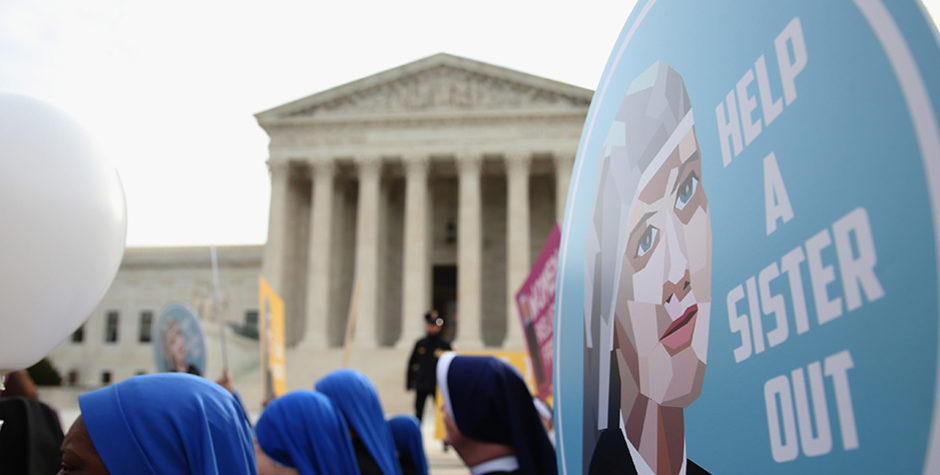Supreme Court Vindicates Little Sisters of the Poor Against the Abortion-Pill Mandate
Today, the U.S. Supreme Court has vindicated the foundational freedom of our country and the Constitution: the right of religious liberty.
In a 7-2 decision, and after nearly a decade of litigation through all levels of the federal judiciary, the U.S. Supreme Court today—once and for all—upheld the right of the Little Sisters of the Poor to follow their religious convictions. The Court upheld the Trump Administration’s regulations that grant moral and religious exemptions to specific employers that object to participating in the Obama-era abortion-pill mandate.
When those regulations were first issued, we submitted formal comments in support of the exemptions. When those regulations were challenged in courts in Pennsylvania and California, we filed amicus briefs in support of the exemptions. And when the Supreme Court decided to take this case, we filed a brief with the Court arguing that the rules are consistent with the Constitution and that the challengers didn’t have legal standing to press their claims.
Justice Thomas wrote the opinion for the majority, joined by Chief Justice Roberts and Justices Alito, Gorsuch, and Kavanaugh.
In sum, the Court held that “the Departments had the authority to provide [moral and religious] exemptions from the regulatory contraceptive requirements for employers with religious and conscientious objections.”
Contrary to the specious arguments raised by the state-challengers, which asserted that the government had no authority to grant the moral and religious exemptions, the Court noted that, under the Affordable Care Act, the Health Resources and Services Administration “has virtually unbridled discretion to decide what counts as preventive care and screenings. But the same capacious grant of authority that empowers HRSA to make these determinations leaves its discretion equally unchecked in other areas, including the ability to identify and create exemptions from its own Guidelines.”
While Congress could have chosen to limit the discretion of the Administration “in any number of ways,” including the authority to grant exemptions from complying with preventive services ordered by the Administration, Congress chose not to do so.
Because the Administration had the statutory authority to grant the exemptions challenged in this case, the Court did not have to decide whether the Religious Freedom Restoration Act (RFRA) requires the exemptions. Nonetheless, Justice Thomas pointed out, quoting the Hobby Lobby decision, that: “RFRA “provide[s] very broad protection for religious liberty.’” Justice Thomas also opined that it “is clear from the face of the statute that the contraceptive mandate is capable of violating RFRA.”
After years of litigating for their religious civil liberties, the concluding words of the Court’s opinion is an answer to the prayers of the Little Sisters of the Poor, and everyone who has joined them in those prayers:
For over 150 years, the Little Sisters have engaged in faithful service and sacrifice, motivated by a religious calling to surrender all for the sake of their brother. “[T]hey commit to constantly living out a witness that proclaims the unique, inviolable dignity of every person, particularly those whom others regard as weak or worthless.” But for the past seven years, they—like many other religious objectors who have participated in the litigation and rulemakings leading up to today’s decision— have had to fight for the ability to continue in their noble work without violating their sincerely held religious beliefs. After two decisions from this Court and multiple failed regulatory attempts, the Federal Government has arrived at a solution that exempts the Little Sisters from the source of their complicity-based concerns—the administratively imposed contraceptive mandate.
We hold today that the Departments had the statutory authority to craft that exemption, as well as the contemporaneously issued moral exemption. . . . Therefore, we reverse the judgment of the Court of Appeals and remand the cases for further proceedings consistent with this opinion.
It’s been a long and winding road, but the Little Sisters have finally made it home. They can now continue to follow their mission of caring for the elderly poor without governmental coercion to violate their religious principles.
The ACLJ successfully represented a total of thirty-two individuals and for-profit corporations in seven different legal actions challenging the abortion-pill mandate.
We were successful before three federal courts of appeal (the Seventh, Eighth, and D.C. Circuits), and obtained a Supreme Court ruling in our favor. In fact, the ACLJ filed the first lawsuit against the Mandate in federal court on behalf of a for-profit employer.
Today’s decision is a resounding victory for religious freedom: for the Little Sisters of the Poor, and for each one of us.
